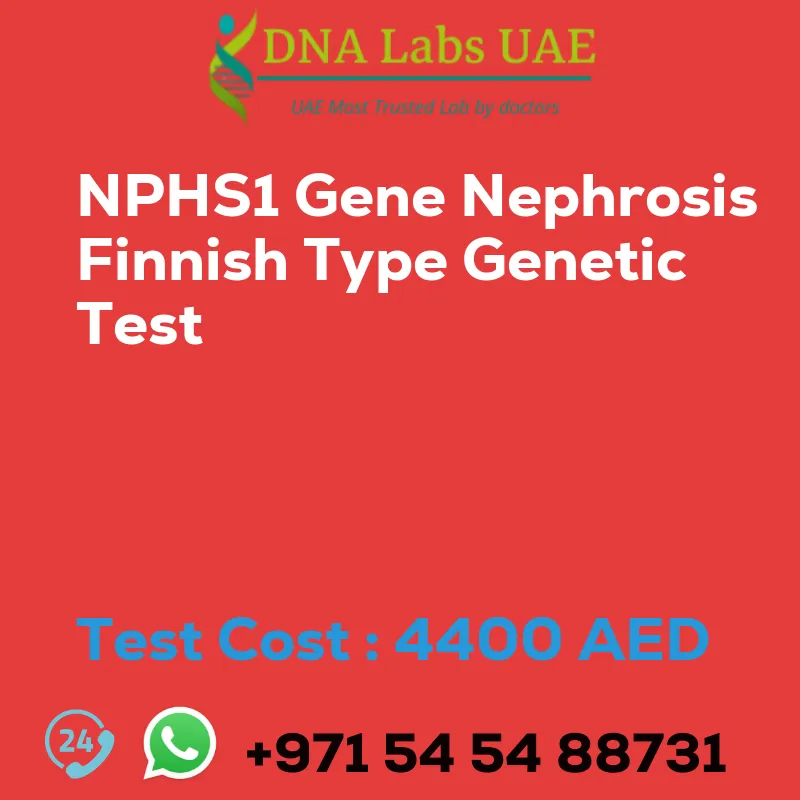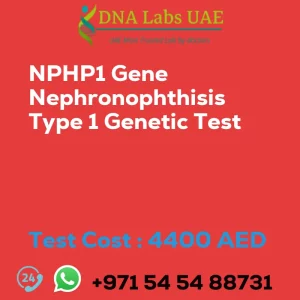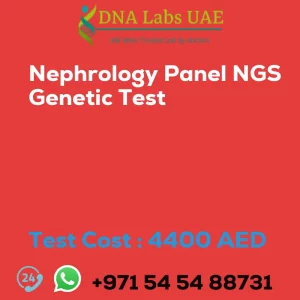NPHS1 Gene Nephrosis Finnish type Genetic Test
Are you concerned about Nephrosis, Finnish type? DNA Labs UAE offers the NPHS1 Gene Nephrosis Finnish type Genetic Test at a cost of AED 4400.0. This test can help diagnose and provide valuable information for genetic counseling. Read on to learn more about this test.
Test Name: NPHS1 Gene Nephrosis Finnish type Genetic Test
Components:
- Price: 4400.0 AED
- Sample Condition: Blood or Extracted DNA or One drop Blood on FTA Card
- Report Delivery: 3 to 4 Weeks
- Method: NGS Technology
- Test type: Hepatology Nephrology Endocrinology Disorders
- Doctor: General Physician
- Test Department: Genetics
Pre Test Information
Before undergoing the NPHS1 Gene Nephrosis Finnish type Genetic Test, it is important to provide the clinical history of the patient. Additionally, a genetic counseling session will be conducted to draw a pedigree chart of family members affected with NPHS1 Gene Nephrosis, Finnish type NGS Genetic DNA Test gene NPHS1.
Test Details
The NPHS1 gene is associated with a genetic disorder called Nephrosis, Finnish type. This disorder is characterized by proteinuria (excessive protein in the urine) and nephrotic syndrome, which includes symptoms such as swelling, high cholesterol levels, and low protein levels in the blood.
NGS (Next-Generation Sequencing) genetic testing is a high-throughput sequencing technology that allows for the simultaneous analysis of multiple genes or even the entire genome. In the case of the NPHS1 gene nephrosis, Finnish type, the NGS genetic test involves sequencing the NPHS1 gene to identify any genetic variations or mutations.
This test can help confirm a diagnosis of Nephrosis, Finnish type and provide information about the specific genetic variant causing the condition. It can also determine the inheritance pattern of the condition and provide information about the risk of passing it on to future generations.
NGS genetic testing for NPHS1 gene nephrosis, Finnish type is valuable for diagnosis, prognosis, and genetic counseling. It can guide treatment decisions and provide important information for affected individuals and their families.
| Test Name | NPHS1 Gene Nephrosis Finnish type Genetic Test |
|---|---|
| Components | |
| Price | 4400.0 AED |
| Sample Condition | Blood or Extracted DNA or One drop Blood on FTA Card |
| Report Delivery | 3 to 4 Weeks |
| Method | NGS Technology |
| Test type | Hepatology Nephrology Endocrinology Disorders |
| Doctor | General Physician |
| Test Department: | Genetics |
| Pre Test Information | Clinical History of Patient who is going for NPHS1 Gene Nephrosis, Finnish type NGS Genetic DNA Test. A Genetic Counselling session to draw a pedigree chart of family members affected with NPHS1 Gene Nephrosis, Finnish type NGS Genetic DNA Test gene NPHS1 |
| Test Details |
The NPHS1 gene is associated with a genetic disorder called Nephrosis, Finnish type. This disorder is characterized by proteinuria (excessive protein in the urine) and nephrotic syndrome, which is a group of symptoms including swelling, high cholesterol levels, and low protein levels in the blood. NGS (Next-Generation Sequencing) genetic testing is a type of genetic test that allows for the simultaneous analysis of multiple genes or even the entire genome. It uses high-throughput sequencing technologies to rapidly sequence DNA samples and identify genetic variations. The NGS genetic test for NPHS1 gene nephrosis, Finnish type involves sequencing the NPHS1 gene to identify any genetic variations or mutations that may be present. This test can help confirm a diagnosis of Nephrosis, Finnish type and provide information about the specific genetic variant causing the condition. By identifying the specific genetic variant, NGS genetic testing can also help determine the inheritance pattern of the condition and provide information about the risk of passing the condition on to future generations. Overall, NGS genetic testing for NPHS1 gene nephrosis, Finnish type can provide valuable information for diagnosis, prognosis, and genetic counseling. It can help guide treatment decisions and provide important information for affected individuals and their families. |








